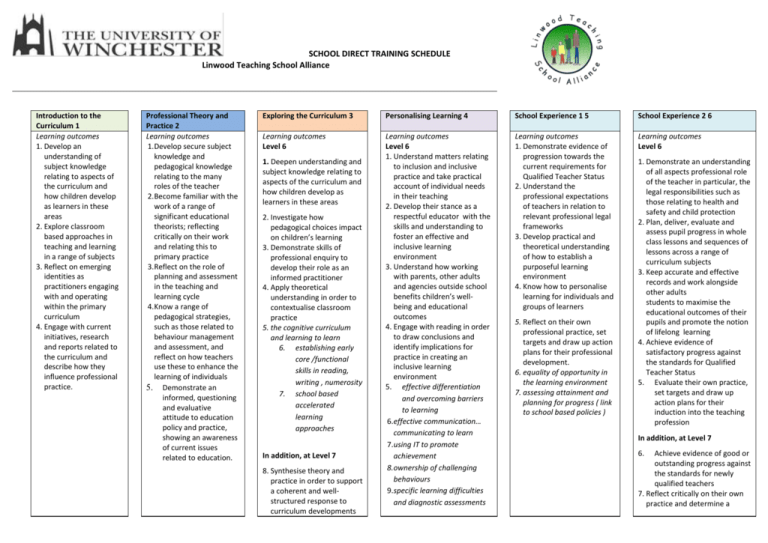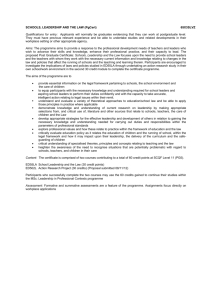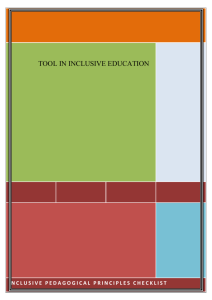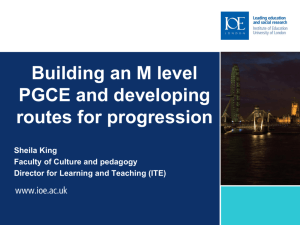LTSA Winchester Schedule numbered outline
advertisement

SCHOOL DIRECT TRAINING SCHEDULE Linwood Teaching School Alliance Introduction to the Curriculum 1 Learning outcomes 1. Develop an understanding of subject knowledge relating to aspects of the curriculum and how children develop as learners in these areas 2. Explore classroom based approaches in teaching and learning in a range of subjects 3. Reflect on emerging identities as practitioners engaging with and operating within the primary curriculum 4. Engage with current initiatives, research and reports related to the curriculum and describe how they influence professional practice. Professional Theory and Practice 2 Learning outcomes 1.Develop secure subject knowledge and pedagogical knowledge relating to the many roles of the teacher 2.Become familiar with the work of a range of significant educational theorists; reflecting critically on their work and relating this to primary practice 3.Reflect on the role of planning and assessment in the teaching and learning cycle 4.Know a range of pedagogical strategies, such as those related to behaviour management and assessment, and reflect on how teachers use these to enhance the learning of individuals 5. Demonstrate an informed, questioning and evaluative attitude to education policy and practice, showing an awareness of current issues related to education. Exploring the Curriculum 3 Personalising Learning 4 School Experience 1 5 School Experience 2 6 Learning 1. outcomes Level 6 Learning outcomes Level 6 1. Understand matters relating to inclusion and inclusive practice and take practical account of individual needs in their teaching 2. Develop their stance as a respectful educator with the skills and understanding to foster an effective and inclusive learning environment 3. Understand how working with parents, other adults and agencies outside school benefits children’s wellbeing and educational outcomes 4. Engage with reading in order to draw conclusions and identify implications for practice in creating an inclusive learning environment 5. effective differentiation and overcoming barriers to learning 6.effective communication… communicating to learn 7.using IT to promote achievement 8.ownership of challenging behaviours 9.specific learning difficulties and diagnostic assessments Learning outcomes 1. Demonstrate evidence of progression towards the current requirements for Qualified Teacher Status 2. Understand the professional expectations of teachers in relation to relevant professional legal frameworks 3. Develop practical and theoretical understanding of how to establish a purposeful learning environment 4. Know how to personalise learning for individuals and groups of learners Learning outcomes Level 6 1. Deepen understanding and subject knowledge relating to aspects of the curriculum and how children develop as learners in these areas 2. Investigate how pedagogical choices impact on children’s learning 3. Demonstrate skills of professional enquiry to develop their role as an informed practitioner 4. Apply theoretical understanding in order to contextualise classroom practice 5. the cognitive curriculum and learning to learn 6. establishing early core /functional skills in reading, writing , numerosity 7. school based accelerated learning approaches In addition, at Level 7 8. Synthesise theory and practice in order to support a coherent and wellstructured response to curriculum developments 5. Reflect on their own professional practice, set targets and draw up action plans for their professional development. 6. equality of opportunity in the learning environment 7. assessing attainment and planning for progress ( link to school based policies ) 1. Demonstrate an understanding of all aspects professional role of the teacher in particular, the legal responsibilities such as those relating to health and safety and child protection 2. Plan, deliver, evaluate and assess pupil progress in whole class lessons and sequences of lessons across a range of curriculum subjects 3. Keep accurate and effective records and work alongside other adults students to maximise the educational outcomes of their pupils and promote the notion of lifelong learning 4. Achieve evidence of satisfactory progress against the standards for Qualified Teacher Status 5. Evaluate their own practice, set targets and draw up action plans for their induction into the teaching profession In addition, at Level 7 6. Achieve evidence of good or outstanding progress against the standards for newly qualified teachers 7. Reflect critically on their own practice and determine a SCHOOL DIRECT TRAINING SCHEDULE Linwood Teaching School Alliance 9. Make good connections and explore key ideas in order to justify approaches to teaching and learning across the curriculum. 10. engaging other professionals 11. involving the family esp. parents/carers 12. learning beyond the classroom (generalisation of skills + wider opportunities for learning ) Disability to ability : 13. historical aspects of SEN, moving from a medical model to a social model ( including the development of SEN legislation) 14. child development and the implications of atypical development 15. special educational needs & learning difficulties ( an introduction to ASD,PMLD, Down Syndrome etc) In addition, at Level 7 16. Demonstrate insight into the complexities inherent in creating an inclusive environment 17. Critically engage with subject knowledge appropriate to the wider context of inclusion to support well-informed practice. rationale for establishing clear targets for on-going professional development 8. Demonstrate a critical insight into their own professional role as teachers by synthesising theory and practice SCHOOL DIRECT TRAINING SCHEDULE Linwood Teaching School Alliance University led Content Nature and content of the primary curriculum, how teachers help children learn within subject areas e.g. Early Reading Portfolio, Arithmetic Portfolio University led Content Teachers’ Standards Educational theorists, learning environment, planning, assessing, reporting, how children learn, behaviour management. School 10. / University led Content National Curriculum subjects SLE inputs / shadowing e.g. Early Reading Portfolio, Arithmetic Portfolio School / University led Content Planning, assessment, behaviour management, inclusion, additional needs, safeguarding. Support Inputs by specialist teachers Tutorial support if curriculum assignment Assessment Level 6 or Level 7 Assignment e.g. Support PDT support Support Inputs by specialist teachers Tutorial support if curriculum assignment Assessment Level 6 only Assignment Assessment Level 6 or Level 7 Individually designed schoolbased investigation linked to a national curriculum subject ( possibly linked to SEF) 20 credits for PGCE 20 credits Masters possible 20 credits Masters possible School led Content Assessed practice against the Standards .Professional responsibilities, school based activities linked to other modules School led Content Extend responsibilities, teach a class for extended period, plan and deliver sequences of lessons informed by assessment and personalised to the needs of all learners Tutorial support if completing assignment Support School Personal Development Tutor and Teacher Tutor UoW QA Support School Personal Development Tutor and Teacher Tutor UoW QA Assessment Level 6 or Level 7 Presentation on a case study Assessment Pass/fail in accordance with Teachers’ Standards (2012) Assessment 20 credits Masters possible 20 credits for PGCE Pass/fail in accordance with Teachers’ Standards (2012) + optional Level 7 submission 20 credits Masters possible






